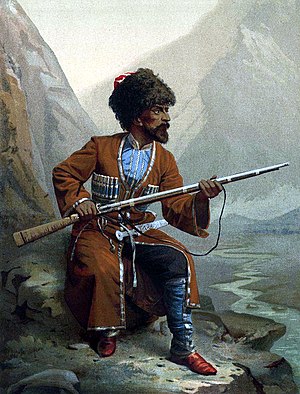 Image via WikipediaA Circassian warrior armed with a sabre and arrows, has been found in a 14th century tomb by Russian archeologists in an ancient barrow in Teuchezhsky Region of Adygeya. Other grave goods included an ornamented silver vessel and a delicately shaped blue jug.
Image via WikipediaA Circassian warrior armed with a sabre and arrows, has been found in a 14th century tomb by Russian archeologists in an ancient barrow in Teuchezhsky Region of Adygeya. Other grave goods included an ornamented silver vessel and a delicately shaped blue jug.When I saw this notice on the Russian-IC website, I was immediately curious since I knew nothing about these tribal people of the Caucasus. Fortunately, I found a very detailed description of a 19th century Circassian warrior written by British traveler in 1836 and assume much of the 19th century costume reflected earlier traditions as well except for accessories related to firearms - compound bows and arrows, sabers and daggers were the primary weapons in the 14th century. These weapons co-existed with firearms for a time in the early 18th century but were no longer worn after that time.
The usual dress of a Circassian warrior of all classes is a tunic resembling a military Polonaise, without a collar, closely fitted to the body, and descending to the knee, secured around the middle by a leather girdle, ornamented, according to the wealth or fancy of the wearer, with gold or silver, in which are stuck a pair of pistols and a poniard: the latter is a most formidable weapon in close combat; during an attack they hold it in the left hand, and from its breadth and length, reaching to the elbow, it serves every purpose of a shield.
In addition to this, the Circassian is armed with a light gun, slung across the shoulder, and a sabre suspended by a silk cord in the Turkish fashion; attached to the belt is a powder flask, and a small metal box containing flints, steel, gun-screws, oil, and, not infrequently, a small hatchet. Hence, a Circassian, whether on foot, or on horseback, is at all times completely armed. Sometimes he carries a javelin, which he uses with singular dexterity and effect, hurling it to a considerable distance with an aim that never errs. The latter weapon is also used as a rest for the rifle, having a groove at the top expressly for that purpose. Bows and arrows are now very rarely used, except in cases where it is necessary to arm the whole population.
On either side of the breast of the coat are the patron pockets, made of morocco leather, usually containing twenty-four rounds of ball cartridge: these not only add to the military appearance of the soldier, but in some measure protect the breast, and are extremely convenient: a round fur cap, with a crown the same colour as the ammunition pocket, is the covering for the head; and cloth trousers, in the eastern fashion, complete the costume. Princes and nobles are alone entitled to the privilege of wearing red; and the Circassian, like the natives of most other eastern countries, shave the head, and are never seen barefoot. When marching, or on a journey, they always add a cloak made from camel or goat's-hair, with a hood which completely envelopes the whole person – this is called a tchaouka [щIакIуэ]..." - Circassian World
 |
| Royal Circassian war costume. Image courtesy of Circassian World |
The tomb found recently, however, did not contain chain mail armor so the occupant was probably not of noble birth. However, its contents may be some of the earliest examples of medieval Circassian weaponry found so far.
"There is a large collection of late medieval Circassian swords and daggers found at excavation sites near Maikop displayed in the Historical Museum of Moscow. Some of the exhibits had inscriptions and were dated to the 16th and 17th centuries AD. There has also been a large haul of weapons unearthed in Kabardian sepulchral mounds that go back to the 15th to 16th centuries AD. These finds represent the Eastern Circassian version of the Belorechenskaya Culture (Belorechenskaya is situated to the northwest of Maikop) in Adigea." - Circassian World
I highly recommend reading the comprehensive article about this fascinating culture on the Circassian World website as it includes a wealth of information and images of both male and female costumes as well as further discussion of their weapons and lifestyle.






Yes, please also read what kind of genocide this nation, Circassians(Adyge, Wubıh, Abaza(Abkhazian)) encountered by Russia in 1864. Thank you for this post.
ReplyDeleteAn Assimilated Circassian.